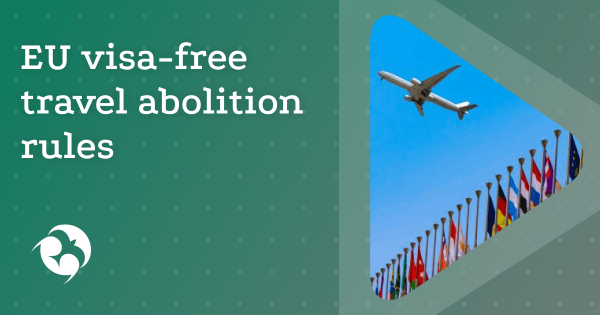The European Parliament has tightened the rules for suspending visa-free travel. Now, visa-free entry can be revoked more quickly and for a wider range of reasons. On October 7, 2025, MEPs supported the reform of the visa suspension mechanism with 518 votes in favor, 96 against, and 24 abstentions. The changes will affect 61 countries whose citizens currently can stay in the Schengen Area for up to 90 days within a 180-day period without a visa.
For what reasons might visa-free travel be revoked?
The list of grounds for suspension has been expanded. Previously, this was primarily due to security threats and migration violations. New criteria have now been added:
- “Golden passport” and citizenship-by-investment programs that create security risks.
- Hybrid threats, including the use of migrants for geopolitical purposes.
- Serious violations of human rights and international humanitarian law.
- Failure to comply with international court decisions.
- Lack of alignment with EU visa policy.
The quantitative thresholds have also changed. A 30% increase in cases of overstay, entry refusals, or serious crimes committed by nationals is sufficient. A low asylum application acceptance rate (less than 20%) may also be grounds for suspension.
What has changed in the timeframes and mechanisms?
The initial suspension now lasts from 9 to 12 months, with the possibility of extending it to 24 months. A selective suspension option has been added: the EU will be able to restrict entry not for all citizens of a country, but only for specific groups, such as government officials responsible for violations.
European Parliament rapporteur Matjaž Nemec called visa policy “one of the most powerful instruments of foreign policy” for Europe, noting that the continent remains the most visited tourist destination in the world. This mechanism now acts as a deterrent for partner countries.
There is already a precedent
So far, Vanuatu is the only country to completely cancel its visa-free travel with the EU. The decision came into effect on 12 December 2024 due to risks associated with the citizenship-by-investment program. The suspension was in effect from 2022 and became permanent in 2024.
The minimum requirement for a Vanuatu passport was $130,000, but the European Commission accused the country of insufficient vetting of applicants, creating migration and security risks. According to Reuters, this was the first time a visa agreement had been completely cancelled specifically because of the “golden passport” program.

Поможем в подборе лучшей программы ВНЖ,
расскажем о подводных камнях,
ответим на ваши вопросы
Don’t expect the visa-free travel to remain unchanged. The new rules give the EU greater flexibility to respond quickly to political and migration changes. Obtaining a residence permit in an EU country is a strategic decision that ensures stability and independence from fluctuations in visa policies. Apply for an EU residence permit now to guarantee your freedom of movement in the future.












